

English Grammar reference. Terms at Grammar Bytes! Five habits of effective English language learners. What habits should English language learners adopt to help them meet their goals?
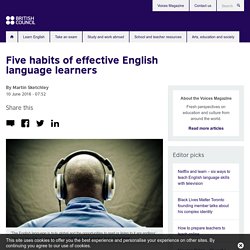
Martin Sketchley, latest winner of the British Council's Teaching English blog award, gives us his top five. Learning English, or any language, can be a challenging but rewarding experience. To make progress, you need to put in a lot of dedication and effort, but you also need to develop the right habits. Here are five habits that have helped my students achieve their aims. 1. The decision to study English, or return to the English language classroom after a long break, can be quite overwhelming. Five digital resources for autonomous English language practice. Cristina Cabal, six-time winner of the TeachingEnglish blog award , tells us her favourite apps, sites and browser extensions to make autonomous learning fun. Language proficiency does not happen within a set time.
It’s a long process that requires patience, and practice outside of the classroom. One way that teachers can encourage learners to practise language autonomously is to provide resources that are fun and effective. Practise your use of formal and informal English with these quizzes. Blog. IELTS Writing Band Descriptors. IELTS WRITING STEP 3.14 MODEL ANSWERS. Task 2 Answer Sheet. Task 1 Answer Sheet. IELTS WRITING STEP 3.14 COMPLETE TEST. IELTS WRITING STEP 3.6 ANSWERS. Environmental news, opinion and analysis from Guardian US. English Vocabulary. Improve your English grammar and vocabulary. Graded reading.
Writing - Advanced C1. Some people think that some types of criminals should not go to prison.
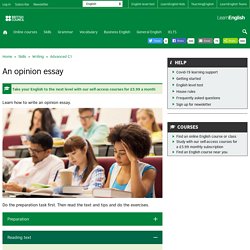
Instead they should do unpaid work in the community. To what extent do you agree? Owing to the great variety of crimes that can be punishable by prison, some people argue that not all criminals are the same and it would therefore be more appropriate to give certain criminals community service instead. I agree that in some cases, prison may not be the best solution and community service would probably have more benefits. An opinion essay about fast food. A for and against essay about online communication. Try these quizzes to test your use of linking words for the CAE Writing paper. Using signpost words and phrases. Conjunctions and linking words. - Introduction. Introduction Academic writing is divided into paragraphs.
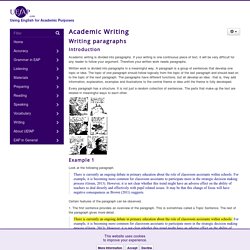
If your writing is one continuous piece of text, it will be very difficult for any reader to follow your argument. Therefore your written work needs paragraphs. Written work is divided into paragraphs in a meaningful way. A paragraph is a group of sentences that develop one topic or idea. Every paragraph has a structure. Example 1 Look at the following paragraph. There is currently an ongoing debate in primary education about the role of classroom assistants within schools. IELTS WRITING STEP 1.19 MODEL ANSWER.
Moodle. Cambridge English Write & Improve. Ieltsmaterial. Ielts usa practice general training writing test. Ac writing sample materials and examiner comments. Academic writing sample task 1c. Academic writing sample task 1b. Academic writing sample task 1a. Writing practice test 1 ielts academic model answers 0 0. Academic Writing - task 1. - 6 Processes. The silicon base is first coated with silicon dioxide, which does not conduct electricity, and then with a substance called photoresist.
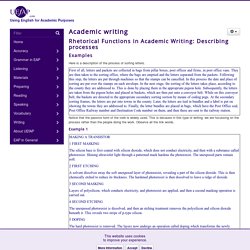
Shining ultraviolet light through a patterned mask hardens the photoresist. The unexposed parts remain soft. A solvent dissolves away the soft unexposed layer of photoresist, revealing a part of the silicon dioxide. This is then chemically etched to reduce its thickness. The hardened photoresist is then dissolved to leave a ridge of dioxide. Layers of polysilicon, which conducts electricity, and photoresist are applied, and then a second masking operation is carried out.
The unexposed photoresist is dissolved, and then an etching treatment removes the polysilicon and silicon dioxide beneath it. The hard photoresist is removed. Describing a graph of trends over time. Describing bar charts about reading habits. Writing - Advanced C1. The table below gives information about some of the world's most studied languages.
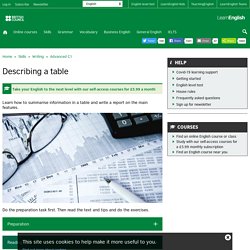
Summarise the information by selecting and reporting the main features, and make comparisons where relevant. The table illustrates some interesting facts about some of the world's most popular languages to learn. It allows comparisons between the number of people who study a language versus those who speak it as a mother tongue, and shows how many countries have speakers of each of the languages. The prominence of English is striking. 1.5 billion people are learning English compared to only 82 million studying the second most popular language to learn, French. English is spoken in 101 countries, roughly twice as many as French and three times more than Chinese. Writing - Upper intermediate B2. Overall, the two pie charts show that smartphones and tablets are used for the same purposes but to very different extents.

The first pie chart shows how people spend their time on smartphones while the second pie chart illustrates how time is spent on tablets. For both types of device, the top use is for games, but the figures differ greatly. 57% of the time spent on a tablet is given to playing games, while only 35% of the time spent on a smartphone is used for this. In contrast, smartphone users spend 29% of their time on their gadget accessing social networking sites compared with just 15% of tablet time spent on the same activity. The third most popular use of the tablet is for consuming entertainment, with users spending 13% of their tablet time watching videos and listening to music.
Writing - Upper intermediate B2. The graph below shows how people buy music.

Summarise the information by selecting and reporting the main features, and make comparisons where relevant. The graph illustrates trends in music buying habits between 2011 and 2018. It presents three different methods: streaming, downloading and buying CDs. Overall, both downloads and physical sales of music have steadily declined. Phrasebank – Describing Trends. IELTS WRITING STEP 1.14 DESCRIBING TRENDS. Describing graphs. In the English-speaking business world you may have to discuss the information on graphs.
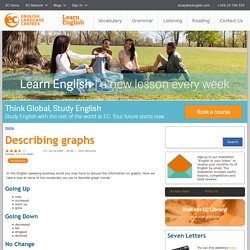
Here we take a look at some of the vocabulary we use to describe graph trends. Going Up. Cambridge English Write & Improve. English writing skills practice. English Skills - Writing. Results and IELTS scores. Receive your IELTS results quickly You won’t have to wait long to receive your IELTS test results.
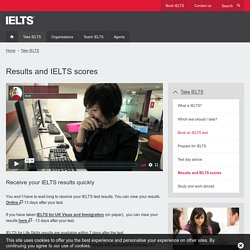
You can view your results Online 13 days after your test. If you have taken IELTS for UK Visas and Immigration (on paper), you can view your results here - 13 days after your test. IELTS for Life Skills results are available within 7 days after the test. Reading practice tests. British Council LearnEnglish. Language exchange community - Speaky. Improve your English grammar and vocabulary. British Council LearnEnglish. English speaking skills practice. British Council LearnEnglish. IELTS International English language test system. British Council LearnEnglish. British Council LearnEnglish. Academic or General Test. Ten don'ts for the IELTS speaking test. Should you use big words in the IELTS speaking test?
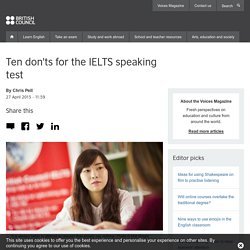
Chris Pell, winner of the British Council’s Teaching English blog award for his post helping IELTS students with pronunciation, gives us his advice in the second part of his list of dos and don'ts for the IELTS speaking test. Read part one for the dos. Don’t memorise answers Lots of people think that the best way to do well in the speaking test is to remember scripted answers and simply use these in the test.
This is a bad idea because memorised answers are very obvious and examiners are trained to spot them. Don't worry about the examiner’s opinion I was surprised when some students told me that you can only do well on the speaking test if the examiner agrees with your opinion. Ten dos for the IELTS speaking test. Is it OK to correct yourself in the IELTS speaking test? Chris Pell, winner of the British Council’s Teaching English blog award for his post helping IELTS students with pronunciation, gives us his advice in the first part of his list of dos and don’ts for the IELTS speaking test.
Do warm up What would happen if a footballer decided to play a game without running or stretching first? They would probably have a terrible game and maybe even injure themselves. Speaking a foreign language is no different. IELTS Speaking: The grammar challenge - IELTS blog. You might be surprised to hear that grammar is one of the four criteria used to assess your IELTS Speaking test performance and that it carries 25% of the points. Many test-takers assume grammar in speaking is only about accuracy and not making any mistakes. This is only half the story. IELTS Speaking: Using technology to improve your vocabulary - IELTS blog.
Using the language as a regular part of your life Being successful with English, in IELTS and beyond, means finding a way to make using the language a regular part of your life. That means gearing your studies to your hobbies, interests, work and daily life. Why? Because learners often feel frustrated and lose interest in studying vocabulary when they find the study materials boring or irrelevant. : Largest collection of video quotes from movies on the web. 183 pronunciations of prefixes in English. English pronunciation dictionary. Phonemic chart. How English learners can improve intonation. What is intonation and how can you improve this aspect of your pronunciation? Fazle Muniem, a teacher at the British Council in Bangladesh, explains. Imagine you are asking a cab driver if he will take you to a shopping centre five kilometres away. He replies – in the most chilling, low, flat voice you have ever heard – 'Sure.
Grammar - Intermediate to upper intermediate. Multi-word verbs. Grammar - Intermediate to upper intermediate. Look at these examples to see how must, might, may, could, can't and couldn't are used in the past. Grammar - Intermediate to upper intermediate. Grammar - Intermediate to upper intermediate. Relative clauses: non-defining relative clauses. Look at these examples to see how non-defining relative clauses are used. Jack, who's retired now, spends a lot of time with his grandchildren.We want to see the new Tom Carter film, which was released on Friday.My sister, whose dog I'm looking after, is visiting a friend in Australia. Relative clauses: defining relative clauses. 'in spite of', 'despite', 'although', 'even though' and 'though' Look at these examples to see how although, even though, in spite of and despite are used.
Although we don't agree, I think she's a brilliant speaker. British Council. Make it to something. IELTS speaking week 2 making notes. IELTS speaking week 2 making notes. How to help English learners use linking expressions. Would you like to help your learners speak more coherently? Svetlana Kandybovich, the latest winner of the British Council’s Teaching English blog award for a post on speaking skills, suggests some useful classroom activities. Learning to speak a language might seem fairly straightforward in principle: first you learn the words, then you form sentences using the correct grammar, finally you string the sentences together. Speaking tips and advice. British Council LearnEnglish. Typical speaking tasks. English Vocabulary - Intermediate to upper intermediate. Conversation Exchange - Language learning with native speakers.
Test format. Test format – Academic Writing 60 minutes Topics are of general interest to, and suitable for, test takers entering undergraduate and postgraduate studies or seeking professional registration.